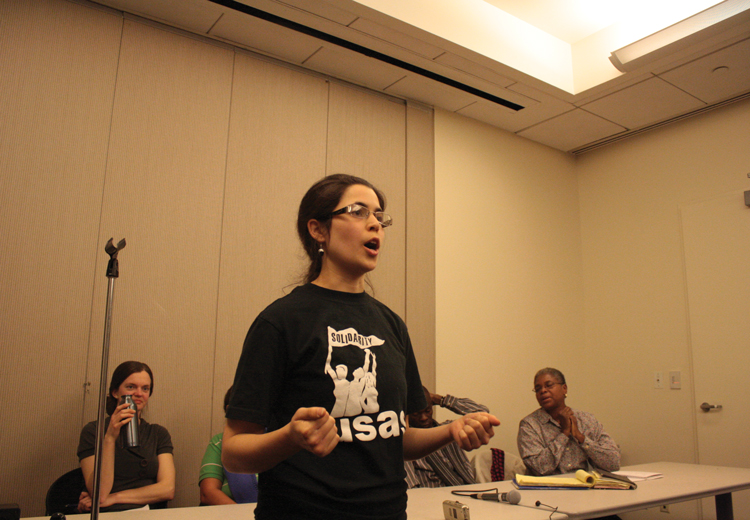
Last night, former sweatshop workers spoke to the NYU community at the Kimmel Center for University Life, the first stop on a nationwide tour to raise awareness about poor international working conditions at international clothing corporations like Adidas and Nike.
Spearheaded by United Students Against Sweatshops, the event featured Telemarque Pierre and Yannick Etienne from Haiti and Raquel Lauarro from Honduras. The speakers shared their stories of working in sweatshops.
Several organizations sponsored the event, including NYU College Democrats and the NYU DREAM Team and was hosted by the Student Labor Act-ion Movement (SLAM). The campaign comes after several colleges and universities severed their ties with Adidas, which manufactures collegiate apparel for NYU.
Alexandra Cardinale, Steinhardt freshman and member of College Democrats, said that she hoped the event would raise awareness for global issues.
“These issues of international development do not have nearly enough support and familiarity within the NYU community, so I am extremely excited [for] the inf-luence and impact the SLAM event garner[s],” she said.
Caitlin MacLaren, Gallatin junior and SLAM organizer, hopes the protest will lead to NYU abandoning the company.
“I hope this inspires people to get involved in the fight for better working conditions everywhere,” she said. “The first step is getting NYU to cut its contract with Adidas.”
Pierre, a member of the Haitian garment union “Sendika Ouvriye Takstil ak Abiman,” which in English is the Textile and Apparel Worker’s Union, said workers could earn as little as 14 cents for producing six dozen shirts.
Etienne expressed the urgency of altering labor conditions. However, difficulty communicating between workers due to language barriers and distance makes solidarity harder to achieve.
“This is a weak point in the struggle because we want to fight. We want to win. We have to communicate. We have to be together, but different languages sometimes separates us,” she said.
A member of a labor union in Honduras and a former textile factory worker, Navarro emphasized the short career span of laborers.
“Many of us started working in the textile factory when we were only 14 years old with a lot of dreams and hopes for a better life. However, whenever we turn 30, many of us are considered old already and it’s hard to get jobs,” she said.
Prachi Vidwans, CAS senior and College Democrats president, att-ended the event to learn more about the situation abroad.
“Sometimes we can feel so disconnected because we don’t see these [working] conditions right in front of us,” she said. “But it’s imp-ortant that we understand that we fall and rise together.”
Mathias Rabinovitch, a CAS senior who also attended the event, hopes that the United States will come to play a larger role in the movement.
“We need to push for the U.S. to become even more friendly with lab-or unions and stop viewing them as groups that bring down the economy,” he said.






















































































































































